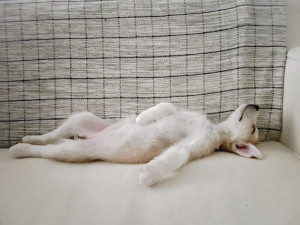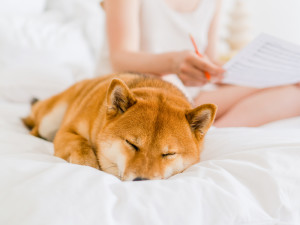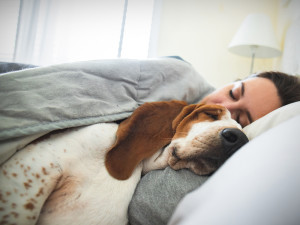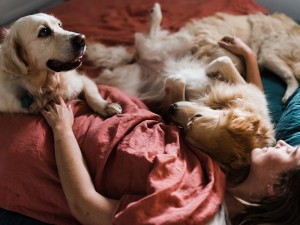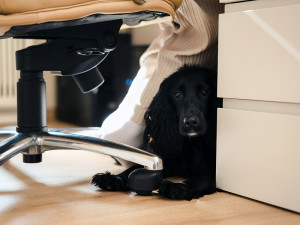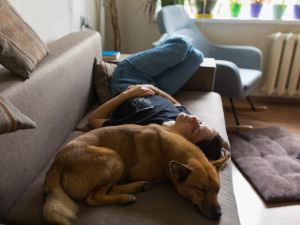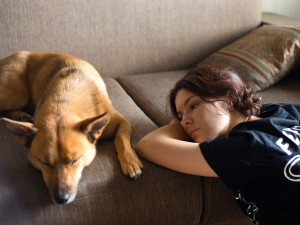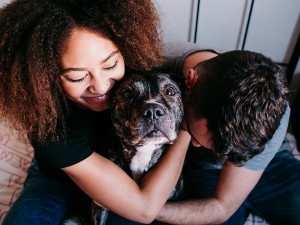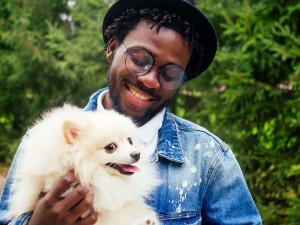Why Napping With Your Pet Is Actually Good for You
This study says you benefit from a power nap. Guess what? So does your cat or dog.

Share Article
Who doesn’t love a good nap? Whether a lazy Sunday afternoon snooze or a quick weekday power nap, a little sleep can be rejuvenating. Dog and cat parents can definitely attest to the joy of a nap. When that little ball of fluff finally stops running around and trying to get into everything and just curls up to sleep, you can relax for a bit.
Our favorite domestic animals are often the kings and queens of sleep (they’re called “cat naps” for a reason). If you just got a new pet and you notice they’re constantly heading off to Snoozetown during the time you’d like to be hanging out with them, guess what? You can just nap with them. Turns out, it’s actually good for you to sneak in a little power nap — why not do it with a snuggly pet by your side?
A little snooze can boost your brain.
Sometimes, your mind just needs a little reset, and a short nap can often provide the reboot your brain requires. A 2022 studyopens in new tab found that naps can help enhance cognitive performance in humans, particularly memory. Napping can also improve vigilance and your ability to process information quickly. The results were consistent across age groups and regardless of when during the day the subject napped.
Shorter naps, however, do have an advantage over longer ones. According to experts, the best nap length is around 20 to 30 minutesopens in new tab. This shorter nap will keep you in a lighter phase of sleep, making it easier to wake up, whereas a longer nap can leave you with that groggy, What year is it? feeling.

Napping with a pet is even better.
So, we know napping can improve your mental acuity in a number of ways, not to mention your mood, but should you share a nap with your pet?
Sleeping with your pet, even for just a short time, can help your dog or cat trust you and lead to a closer bond over your pet’s lifetime. Plus, snuggling up to your pet leads to an increase in the release of neurotransmitters like dopamine and oxytocinopens in new tab, often referred to as “feel-good hormones.” For those who suffer from anxiety or depression, that happy hormone boost can be a definite plus.
“Some pets enjoy napping with their people, while others prefer their own space,” Dr. Valli says. “Pets that show any reactive or aggressive behavior when they are touched, jostled, or moved while resting should not nap with their people for safety reasons.”
Whether you choose to snooze with your pet or not is, of course, entirely up to you. Some people are restless or light sleepers and can easily be disturbed by the presence of an animal in the bed, even for a nap. And if you have any pet allergies, allowing your dog or cat in the bed is probably not the best idea. But if you and your pet don’t mind, taking a nap with your dog can boost your immunity to bacteriaopens in new tab, as well as your mental and emotional well-being.
“Co-sleeping with pets can have practical benefits, such as increased heat and, when desired, increased security,” Dr. Valli says. “However, research on human-pet co-sleeping is sparse. Co-sleeping may increase attachment of dogs and people toward each other. Petting animals has been shown to have numerous benefits, including decreased blood pressure, heart rate, and depression. It is possible that co-sleeping may help as well.”
Dogs and cats — especially puppies and kittens — actually need naps.
If your pet happens to be growing still, they’re definitely be good nap buddies. Both dogs and cats require more sleep than humans, especially when they’re young. The average dog spends as much as half the day (12 to 14 hours) snoozing, while cats may nap for as much as 18 to 20 hours. Younger animals sleep even longer, so don’t be surprised if your puppy is asleep for 18 to 20 hours and your kitten passes the 20-hour mark.
“Sleep is very important for neuronal development and information processing,” Dr. Valli says. “Puppies’ and kittens’ brains are still developing until over a year of age, and when young they are learning extensively. Therefore, nap times are very helpful for facilitating that development. They are also going through very rapid physical growth during the first several months of life, which also takes a lot of energy and promotes napping.”
Your pet may also take smaller naps throughout the day to pass the time when you’re away from home or just because they feel comfortable and at ease. (We’ve all seen how much cats love a good sunbeam nap.) If you’re worried that your pet is sleeping too much, talk to your veterinarian, but in most cases, dogs and cats just enjoy a good snooze. And who can blame them?
A pup snuggle sesh will do you good.
Not every pet parent is up for a night full of snuggles, especially if your cat wants to sleep on top of you. But a little nap time with your pet can be a great way to bond with them, improve your mood, and help you feel a little mentally sharper as you go through the rest of your day. Plus, how can you resist some sleepy cuddles?
References:
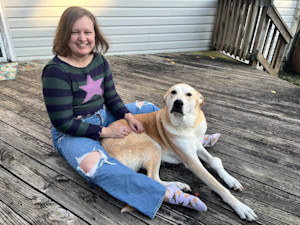
Savannah Admire
Savannah Admire is a writer and pet mom to two dogs and a cat. Under the name Savannah Cooper, she has published poetry in 40 different publications, as well as a poetry book, Mother Viper (2025). When she’s not writing, you can find her reading, taking photos, or volunteering as a content creator for her local community theatre. As a pets writer, she focuses on cat and dog behavior and pet parenthood. She currently lives in Western Maryland.
Related articles
![Woman lying in bed with two golden retrievers]()
13 Reasons You Should Let Your Dog Sleep in Your Bed
It’s science (and adorable).
Why Do Dogs Lay on Your Feet?
Not that anyone’s complaining...
![Woman wearing a black t-shirt and jeans laying on the couch with her dog taking a nap]()
What Are the Effects of Sleeping With Your Dog in Bed?
There are pros and cons of sleeping with your dog — for both of you.
Does My Dog Love Me? How to Interpret Canine Bonding Behavior
What to do when you don’t feel the close bond you want.
![Couple hugs their merle Boxer]()
How to Improve Your Relationship with Your Dog
Animal behaviorist Dr. Karen B. London on how to strengthen your pet-parent bond.
![Man hugging his fluffy white dog happily]()
Chemistry Between People and Dogs Is Real (It’s Science)
How the “love hormone” oxytocin connects us with our pups.

